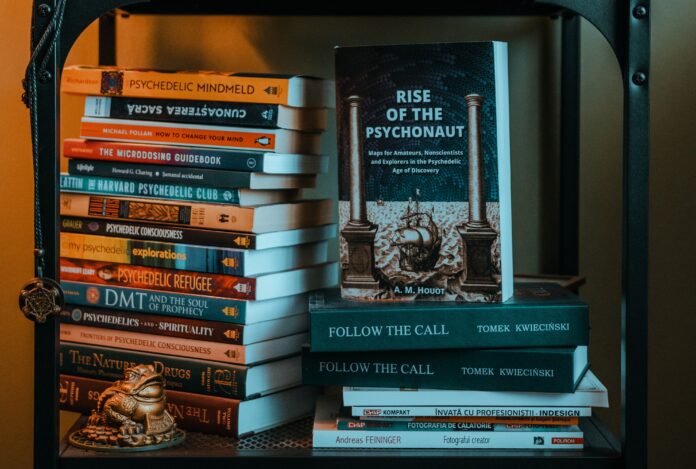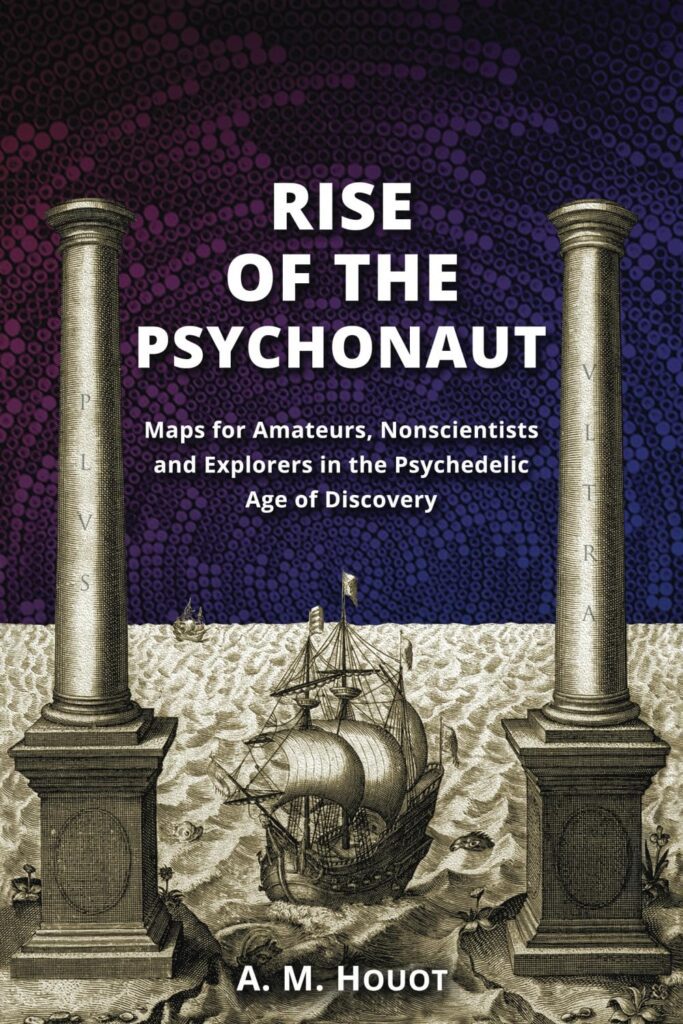Psychedelia has a marketing problem. Open any mainstream article, self-help blog, or TED Talk about psychedelics today, and you will be greeted by the same slogans: Healing is possible, Your trauma can be treated, Science is finally catching up with ancient wisdom. In this sanitized narrative, psychedelics have been scrubbed clean and packaged neatly, sold back to you as therapy, spirituality, or cutting-edge mental health treatment.
A.M. Houot is not here for any of that.
“I told a white lie. I’m not sick. I’m just curious.”
That sentence, tucked into the early pages of A.M. Houot’s Rise of the Psychonaut, is not only a personal confession. It’s a cultural heresy—and perhaps the most honest declaration in the psychedelic renaissance to date.
Because this is not a book about being saved. Not about mystical breakthroughs. Not about curing PTSD, nor getting permission from a government agency or an ayahuasquero.
This is a book for the explorer—for those of us whose motives for taking psychedelics can’t be easily packaged into therapy, healing, or religious ritual. It’s a book for the curious and the capable. A manifesto for what Houot calls amateurs, nonscientists, and explorers. And it is, without qualification, one of the most important and original psychedelic books of the last decade.
What This Book Isn’t—And Why That’s Its Strength
Most psychedelic literature falls into two categories: (1) historical/ethnographic overviews of sacred traditions, or (2) memoirs-turned-advocacy for the healing power of psychedelics. Both genres have value. But both, intentionally or not, limit the scope of what psychedelics can be.
Houot wants none of it. This isn’t about “changing your mind”—it’s about using your mind. He rejects the prevailing medical and mystical metaphors in favor of a framework that is neither therapeutic nor transcendental. Instead, he proposes something radical in its simplicity:
Psychedelics as Technology
“In outer space, we use technology to move our physical body from place to place; in hyper space, we ingest our technology to move our perception from place to place while the body stays put.”
Not medicine. Not magic. Not a return to Eden. Tools. And like any tools, they require method, training, infrastructure, and a proper use case. This one idea—not new, but here fully articulated—is the philosophical backbone of the book. And once you see through that lens, the psychedelic landscape looks very different.
The Psychedelic Age of Discovery
One of the book’s greatest strengths is how it situates this moment in history. Drawing a bold parallel between the European Age of Exploration and today’s blossoming psychedelic movement, Houot argues we are standing at the edge of a new Age of Discovery. But this time, the frontier is not physical terrain—it’s subjective experience.
“We are on the precipice of welcoming an equally important parallel track of inquiry to the Psychedelic Renaissance, that is, the Psychedelic Age of Discovery.”
Just as the invention of ships and navigation tools allowed explorers to traverse oceans, Houot envisions a future where psychonauts are equipped with methodologies, training, and shared data protocols—tools to systematically traverse nonphysical terrain.
He asks:
- What if we approached psychedelics the way we once approached outer space?
- What if we collected data from users as rigorously as we do from astronauts?
- What if we stopped asking, “How does it make you feel?” and started asking, “What did you see, and can it be replicated?”
In this context, Houot’s audacious suggestion to create a “NASA of Psychedelics” doesn’t sound so absurd—it sounds like the next logical step. Not a metaphorical journey, but a program of literal, methodical exploration into altered states.
Houot writes as an outsider, and that’s precisely why his perspective hits so hard. This book could not have been written from within a university psychology department or a Silicon Valley biotech startup. It is the product of amateurism in the highest sense of the word—self-motivated, rigorously curious, and unbound by academic or commercial incentives.
He dares to ask questions professionals might avoid:
- Why have psychedelics been monopolized by the healing narrative?
- Why is spiritual language so often used to obscure rather than illuminate?
- Why do so few people admit they use psychedelics simply to know?
Houot’s answer is clear: if institutions won’t go there, we should.
“If professional researchers can’t or won’t tell the rest of us what these visionary realms are and what they’re like… I think nonscientists and amateurs should take it upon themselves to do these investigations.”
That line might as well be a declaration of independence for the underground psychonaut.
The War on Drugs, The Renaissance, and What Comes Next
The book doesn’t shy away from contextual history either. Houot critiques the War on Drugs not just as a political tragedy, but as a cognitive bottleneck that delayed our capacity to take psychedelics seriously as technologies. He acknowledges the importance of the current medical and therapeutic renaissance, but frames it explicitly as Phase One—a necessary but limited stage.
The real work, he argues, begins after the clinics and clinical trials. The real work is exploration.
Field Methodology: How Rise of the Psychonaut Teaches You to Document Psychedelic Experience
One of the book’s most valuable contributions is its clear, structured method for documenting psychedelic experiences, adapted from phenomenology (the philosophical study of experience).
The Four-Step Phenomenological Method
- Natural Attitude Suspension
Put aside assumptions. Approach the experience without preconceptions. - Reduction
Focus only on what you directly experience—sounds, colors, shapes, feelings—without interpretation. - Imaginative Variation
Re-examine the experience from multiple angles. Ask how it could have appeared differently. - Intersubjective Confirmation
Compare your reports with others to identify shared structures and patterns.
Describing Lived Experience
Houot also encourages readers to:
- Write down their experiences as soon as possible
- Avoid cosmic conclusions or therapy language
- Be precise, clear, and observational
- Treat their experience report as a field log, not a diary
The goal is to slowly build a shared, secular map of altered consciousness—just as explorers once mapped the physical world.
Who This Book Is For
As a fellow explorer and wonderer myself, this book hit me exactly where I live.
If you’re looking for psychedelic memoirs, mystical awakenings, or therapeutic miracles—this isn’t your book.
But if you’ve ever felt that psychedelics are less about healing and more about discovery, this book will feel like it was written for you.
If Michael Pollan’s How to Change Your Mind is the tourist brochure, Rise of the Psychonaut is the technical manual left in the cockpit.
It will not hold your hand.
It will not tell you you’re special.
It will hand you a notebook, a compass, and a very dry, rational smile and say:
Now go look. And come back. And tell us what you saw.
Where It Could Be Stronger (A Honest Critique)
Houot himself invites critique in his book—and he deserves it.
Here’s what could have made this otherwise excellent book even stronger:
Technologist’s Blind Spot
Houot’s commitment to rationalism is admirable—but it occasionally edges into an almost clinical detachment. The book rarely addresses the emotional, aesthetic, or existential dimensions of psychedelic experience. Readers may wonder whether the project of mapping and cataloging altered states risks sterilizing the very thing that draws people to them. Houot may be trading one dogma (spiritual hype) for another (technological obsession). The human messiness of psychedelic experience risks being flattened into protocols.
Insufficient Ethical Reflection
The book encourages decentralized, amateur exploration—but rarely addresses the ethical and psychological risks of such a project. Who is responsible when things go wrong? What safeguards should be in place?
The Limits of the Space Metaphor
Houot’s framing of a “Psychedelic Age of Discovery” and a “NASA for inner space” is bold, practical, and inspiring—but it has its limits. Human consciousness is not a clean, mappable frontier. Unlike continents or galaxies, altered states of mind are deeply subjective, emotional, and often chaotic. For many people—artists seeking creative fuel, spiritual seekers looking for connection, or those carrying the heavy weight of trauma—psychedelics aren’t navigated like a landscape, but experienced like a storm, a vision, or a catharsis. The explorer’s map is valuable, but it may never fully capture the depth, beauty, or messiness of what drives so many to these substances in the first place.
And yet—could it be that even these wild, ineffable experiences might one day be charted, not by flattening them, but by collecting enough maps to reveal the patterns within the chaos? That is the tension at the heart of Houot’s project: the possibility that, over time, even the most personal, poetic, or painful journeys might contribute to a shared cartography of consciousness.
The explorer’s map may never capture the full beauty or messiness of the inner world—but perhaps it can at least show us where the storms tend to gather.
Get the Book
Discover A.M. Houot’s Rise of the Psychonaut: Maps for Amateurs, Nonscientists, and Explorers in the Psychedelic Age of Discovery—the essential field manual for rational explorers of consciousness.
About the Author
A.M. Houot is a philosopher, writer, and explorer of non-ordinary states of consciousness. His academic background in Philosophy of Science, Technology and Society informs his unique approach to psychedelics—not as medicine or mysticism, but as tools for disciplined exploration. His book Rise of the Psychonaut lays the groundwork for a new, secular Age of Discovery. He is currently researching his next book.

